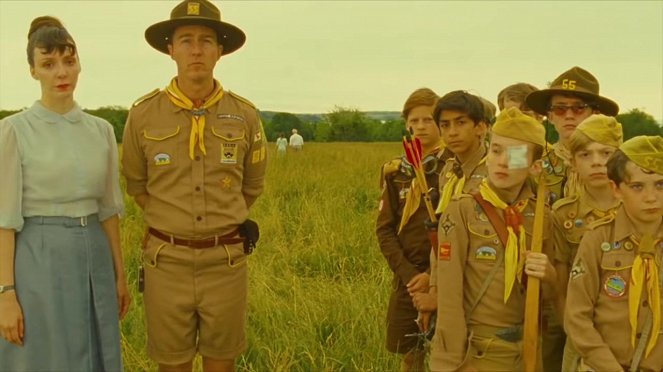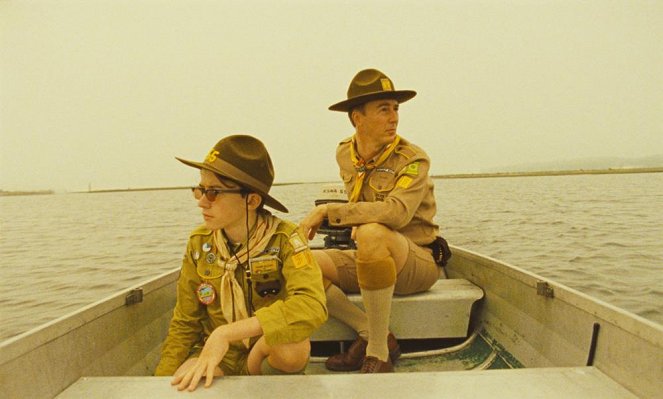Director:
Wes AndersonCámara:
Robert D. YeomanMúsica:
Alexandre DesplatReparto:
Bruce Willis, Edward Norton, Bill Murray, Kara Hayward, Jared Gilman, Jason Schwartzman, Tilda Swinton, Frances McDormand, Harvey Keitel, Bob Balaban (más)Sinopsis(1)
Ambientada en una isla de la costa de Nueva Inglaterra en el verano de 1965, la película cuenta la historia de una chica y un chico de doce años que se enamoran, hacen un pacto secreto y se escapan a terrenos selváticos e inexplorados. Cuando varias autoridades intentan perseguirlos, se forma una violenta tormenta en la costa... y la comunidad de la pacífica isla se verá trastornada irremediablemente. (Alta Films)
(más)Videos (27)
Reseñas (12)
Svérazné pojetí skautského tábora a docela dobře už chápu, proč se všude píše, že filmy Wese Andersona jsou žánrově nezařaditelné. Výborný výkon ústřední dětské dvojice, mého oblíbence Nortona a Willise v nezvyklé poloze. Možná se někdy dokopu k Životě pod vodou, jejž jsem kdysi po deseti minutách příšerného nudění vypnul.
()
Anderson's scout sale - contrived, copied from previous deeds, atypically unfinished (so many ideas simply just fade out), and more than anemic in terms of the storytelling. I accept the poetry of the first loves and boy's camping, but I expect more from Wes than the amusing shallowness, which mainly turns into a total spasm in the end.
()
I have to say that this time the whole is less than the sum of its parts. In Moonrise Kingdom, Wes Anderson works everything (everything that the eye can see) to the tiniest detail, which is nice and I appreciate it, but the charm of the story gets drowned under all that heavy and refined splendour. Visually, it’s beautiful – it was a lot of fun to pour over each scene and notice how Anderson moves with the camera (the opening credits!) – but I never got into the story and it didn’t affect me at all on an emotional level. All of Anderson’s films are standoffish, but you can find in them places to feel sad or moved… but here I missed them. The same applies to his characters, they are all (very) weird, but this time I missed the vitality I felt in Mr. Fox, Zissou and others. In Moonrise Kingdom I only found that vitality in Bill Murray’s character (the night scene in the bed), who was given very little space. Immediately after watching it, an unenthusiastic 80%, but it needs to lager a couple of days.
()
Wes Anderson lives in a strange world full of strange and crazy people. It seems a bit as if his films had eaten a ton of mushrooms before the screening, and I watched the rain alternating with cloudy weather. And that’s when the moon comes out. Anyway, I have to say plainly that I expected a little more, mainly because of the great cast who appear in the film. That included both my favorite Bruce Willis and, on the contrary, Edward Norton, with whom I never know what to think, as well as the director’s staples like Bill Murray and Jason Schwartzman, who are always joy to watch. I didn’t have a problem with the actors; what was worse was the storytelling and the scouts, who seemed to have crawled out of the factory for the absolute. It was nice, but it was weird and that’s why the three stars are just right.
()
At the idea level, Moonrise Kingdom is basically a live-action version of Fantastic Mr. Fox, but with greater interest in the juvenile protagonist, who in Anderson’s film is equal to the adult protagonists (which is nicely shown in the partner relationship between Captain Sharp and Sam). This time, the king of indie films expresses his reluctance to leave the realm of childhood and to give up the wilderness and his own nature in favour of civilisation with a strong tinge of nostalgia (which somewhat clashes with several unexpectedly grown-up scenes of youthful first love). Even his inimitable playfulness sometimes has to give way to it. The banality of some of the plot twists and character transformations, which is the result of having too many characters and the effort to appropriately reward each of them, contrasts with the incredible degree of care put into each shot. The jokes don’t scream for our attention and it perhaps isn’t even possible to catch all of them or, as the case may be, find them in the mise-en-scéne on the first viewing. Anderson is able to work with the setting with a similar imaginativeness and poetic sense of space as, for example, Jacques Tati. Unlike Tati, however, he works with smaller areas (the Bishops’ home gives the impression of a dollhouse thanks to its “fragmentation” into individual rooms) as well as panoramas of more expansive exterior spaces so that they seem very flat (perhaps like side-scrolling video games). My admiration for the meticulousness and imaginativeness with which the film was made (i.e., not made up) outweighed my enchantment this time, but even so, it is still a huge shift in my attitude, since a few years ago I ranked Anderson among the directors that I would never even remotely be friends with. 85%
()



Anuncio